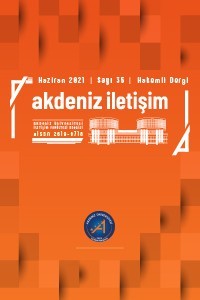Sosyal Medyanın Eğitim lı Kullanımları ve Problem-Tabanlı Öğrenme
Sosyal medya araçlarının çıkışının gerisindeki neden, sosyal medyanın eğitim amaçlı kullanımları olmasa da, eğitim amaçlı kullanımların kabul görmesine yönelik bir trend görülmektedir. Sosyal medya, öğrenenlerin, çoğu zaman, gerçek yaşamdaki bağlamında (otantik öğrenme) birbirlerinden öğrenmelerine (yatay öğrenme), bir amaca ulaşmak için birbirleriyle işbirliği yapmalarına ve eğitim süreçlerine aktif olarak katılmalarına izin vermektedir. Örnek-tabanlı öğrenmeyle yakın bir ilişki içinde olan sorun-tabanlı öğrenme, özellikle tıp okullarında yaygın bir yaklaşımdır. Ancak, sosyal medyanın eğitim amaçlı kullanımlarıyla sorun-tabanlı öğrenme arasındaki bağlar, ilgili literatürde kapsamlı olarak araştırılmamıştır. Bu nedenle, bu makalede, şu konular ele alınmıştır: Soruntabanlı öğrenmenin tanımları, bunun program düzeyinde uygulanabilirliği, özel ders verme süreci, modelin etkililiği, akademik kadro ya da öğrenciler ile ve uzmanlar ya da uzman olmayanlar ile özel ders, sosyal medyanın eğitim amaçlı kullanımları ve son olarak, sosyal medyanın soruntabanlı öğrenme için elverişliliği
Anahtar Kelimeler:
Sosyal Medya, Eğitim, Sorun-Tabanlı Öğrenme
Educational Uses of Social Media and Problem-Based Learning
Although potential educational uses of social media was not the reason behind the emergence of social media tools, a trend towards recognizing the educational uses is visible. Social media allows learners to learn from each other (horizontal learning) in the real-life context (authentic learning) most of time, to collaborate with each other to reach a goal, and to participate actively to educational processes. Problem-based learning which is strongly associated with case-based learning is a common approach in medical schools in particular. However, the links between educational uses of social media and problem-based learning are not researched extensively in relevant literature. Thus, in this article, the following were considered: Definitions of problembased learning, its applicability at the program level, the process of tutoring, effectiveness of the model, tutoring by staff vs. students and experts vs. non-experts, educational uses of social media and finally, feasibility of social media for problem-based learning
Keywords:
Social Media, Education, Problem-Based Learning,
___
- Bahar-Ozvaris, Sevkat, Cuhadaroglu Cetin, Fusun, Turan, Sevgi and Peters, Antoinette S. (2006).
- “Cooperative learning: A new application of problem-based learning in mental health training.” Medical Teacher. Vol.28, No.6: 553-557.
- Bonzo, Justin and Parchoma, Gale (2010). “The paradox of social media and higher education institutions.” In Proceedings of the 7th International Conference on Networked Learning 2010. Dirckinck-Holmfeld, Lone, Hodgson, Vivien, Jones, Chris, de Laat, Maarten, McConnell, David, and Ryberg, Thomas (ed.). Lancaster: Lancaster University. 912-918.
- Connolly, Mark (2011). “Benefits and drawbacks of social media in education.” WCER Research Highlights. Vol.22, No.4: 1-2.
- Das, M., Mpofu, D.J.S., Hasan, M.Y. and Stewart, T.S. (2002). “Student perceptions of tutor skills in problembased learning tutorials.” Medical Education. Vol.36: 272-278.
- Enarson, Cam and Cariaga-Lo, Lisa (2001). “Influence of curriculum type on student performance in the United States Medical Licensing Examination Step 1 and Step 2 exams: Problem-based learning vs. lecturebased curriculum.” Medical Education. Vol.35: 1050-1055.
- Eshach, Haim and Bitterman, Haim (2003). “From case-based reasoning to problem-based learning.” Academic Medicine. Vol.78, No.5: 491-496.
- Gilkison, Andrea (2003). “Techniques used by ‘expert’ and ‘non-expert’ tutors to facilitate problem-based learning tutorials in an undergraduate medical curriculum.” Medical Education. Vol.37: 6-14.
- Glew, Robert H. (2003). “The problem with problem-based medical education: Promises not kept.” Biochemistry and Molecular Biology Education. Vol.31, No.1: 52-56.
- Good, Judith, Howland, Katherine and Thackray, Liz (2008). “Problem-based learning spanning real and virtual words: A case study in Second Life.” ALT-J, Research in Learning Technology. Vol. 16, No.3: 163-172.
- Griesemer, James A. (2012). “Using social media to enhance students’ learning experiences.” Quality Approaches in Higher Education. Vol.3, No.1: 8-11.
- Kent County Council e-Safety Strategy Group (2011). Using social media and technology in educational settings: Considerations, guidance and risk assessment templates for schools and educational settings considering the use of social media. Kent: Kent County Council.
- Lloyd-Jones, G., Ellershaw, J., Wilkinson, S. and Bligh, G.J. (1998). “The use of multidisciplinary consensus groups in the planning phase of an integrated problem-based curriculum.” Medical Education. Vol.32: 278- 282.
- Lohman, Margaret C. and Finkelstein, Michael (2002). “Designing cases in problem-based learning to foster problem-solving skill.” European Journal of Dental Education. Vol.6: 121-127.
- Papinczak, Tracey, Tunny, Terry and Young, Louise (2009). “Conducting the symphony: a qualitative study of facilitation in problem-based learning tutorials.” Medical Education. Vol.43: 377-383.
- Pastirik, Pamela J. (2006). “Using problem-based learning in a large classroom.” Nurse Education in Practice. Vol.6: 261-267.
- Prince, Katinka J.A.H., Mameren, Henk, Hylkema, Nelien, Drukker, Jan, Scherpbier, Albert J.J.A. and Vleuten, Cees P.M. (2003). “Does problem-based learning lead to deficiencies in basic science knowledge? An empirical case on anatomy.” Medical Education. Vol.37: 15-21.
- Redecker, Christine, Ala-Mutka, Kirsti and Punie, Yves. (2010). Learning 2.0 - The Impact of Social Media on Learning in Europe. Luxembourg: Office for Official Publications of the European Communities.
- Rodriguez, Julia E. (2011). “Social media use in higher education: Key areas to consider for educators.” MERLOT Journal of Online Learning and Teaching. Vol.7, No.4: 539-550.
- Savin-Baden, Maggi (2003). “Disciplinary differences or modes of curriculum practice?: Who promised to deliver what in problem-based learning?” Biochemistry and Molecular Biology Education. Vol.31, No.5: 338- 343.
- Shanley, Paul F. (2007). “Leaving the “Empty Glass” of Problem-Based Learning Behind: New Assumptions and a Revised Model for Case Study in Preclinical Medical Education.” Academic Medicine. Vol.82, No.5: 479-485.
- Steele, David J., Medder, Jim D. and Turner, Paul (2000). “A comparison of learning outcomes and attitudes in student- versus faculty-led problem-based learning: an experimental study.” Medical Education. Vol.34: 23-29.
- Wagner, Ronald (2011). “Social media tools for teaching and learning.” Athletic Training Education Journal. Vol.6, No.1: 51-52.
- Yayın Aralığı: Yılda 3 Sayı
- Başlangıç: 2003
- Yayıncı: Akdeniz Üniversitesi
